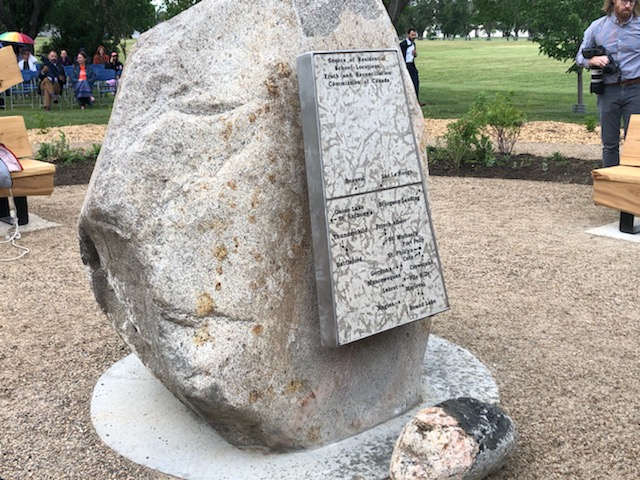Despite a little bit of rain, the show still went on for the City of Regina where many attended a day dedicated to celebrate the culture and heritage of First Nations, Inuit and Métis peoples in Canada.

Hundreds of people young and old showed up to the various events for the National Indigenous Peoples Day where dancing, singing, food and music took place. It was the first time since the COVID-19 pandemic was declared that events happened in person.
For one organization, the focus was on food security and giving back to the community.
“We put an invitation out to community members to bring a booth or a table … some (brought) food and snacks,” said Teresa Innis, Newo Yotina Friendship Centre essential services manager. “Part of that is the highlight food insecurity in the area. We know that a lot come to us and other agencies for different food resources.”
The Newo Yotina Friendship Centre held a street fair with informational booths, powwow dancing, Metis jiggers, performers and kids crafts along with guest speakers.
In the heart of downtown at City Square Plaza, different schools, community members and organizations enjoyed a few hours of entertainment including Manitoba’s Asham Stompers who wowed the crowd with their choreographed performance, as well as a skit from comedian Conway Kootenay.

Get daily National news
“A lot of people don’t understand the culture and tradition, especially the language of our people,” said Kootenay. “National Aboriginal Day is a way for us to showcase that (and) to educate people who don’t get to come to the reserve, powwows or events. It’s a great time to be able to do that.”

At Government House, the Saskatchewan Lt.-Gov. Russ Mirasty along with Elder Ted Quewezance, a residential school survivor from Keeseekoose First Nation, unveiled a Saskatchewan Residential School Memorial.
The memorial, which is placed on a large rock, shows a map of Saskatchewan’s residential school locations to educate visitors about the history of residential schools.
- Latest alleged Iranian regime official found in Canada wants his identity hidden
- Why Canadian beer cans are ‘almost impossible’ as tariffs near 1-year mark
- Jivani’s trip to Washington has some Conservative MPs scratching their heads
- Canada’s new Greenland consulate officially opens with patriotic ceremony
“There’s a lot of bad things that happened to us. We don’t need people to feel sorry for us. Please don’t do that,” said Quewezance. “Us survivors, we’re here in a very good way … healing is a lifetime journey.”

“We need a lasting place where people can come to remember, reflect, to pray, and to think about what the residential schools did to our country (and) specifically to Indigenous people,” said Mirasty, who is also a residential school survivor.
There was also graveyard cleaning at the Regina’s Indian Industrial School site where community members cleaned the graves and ended with a feast.









Comments